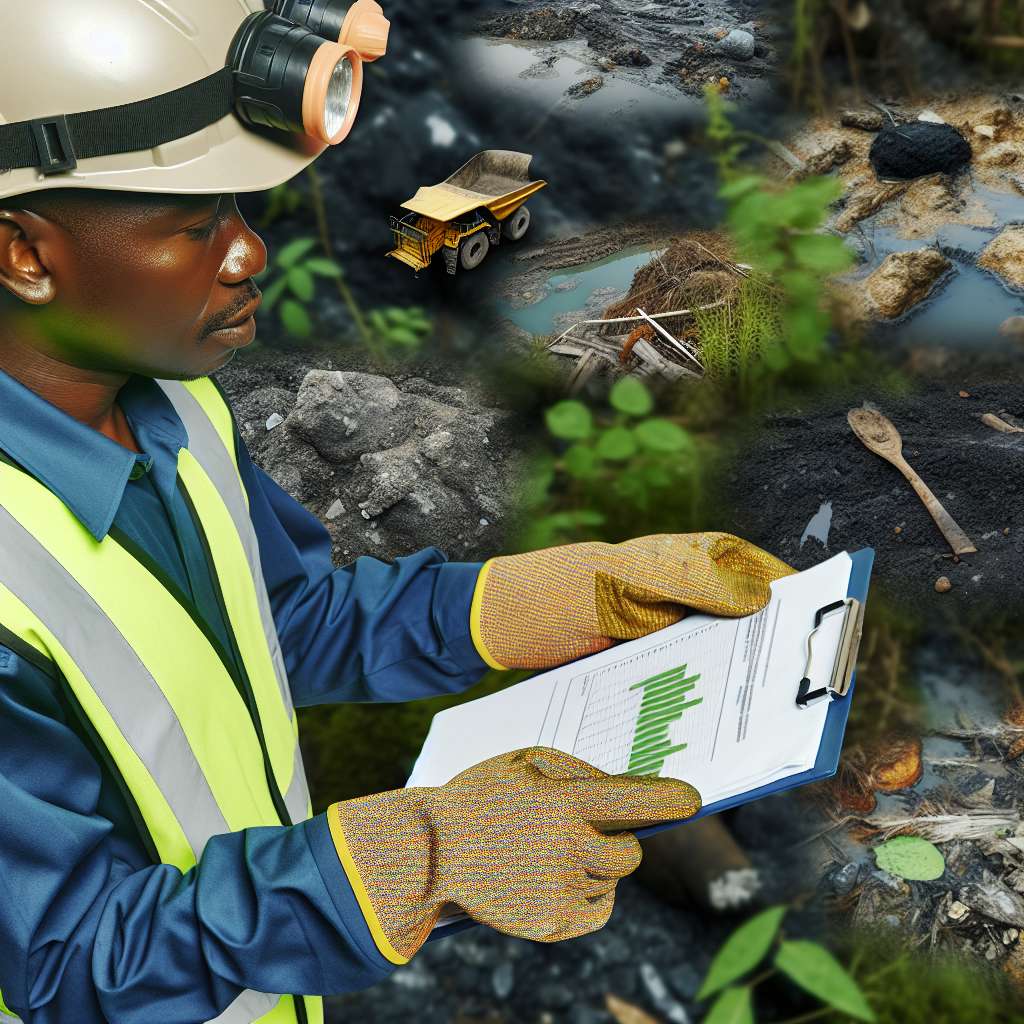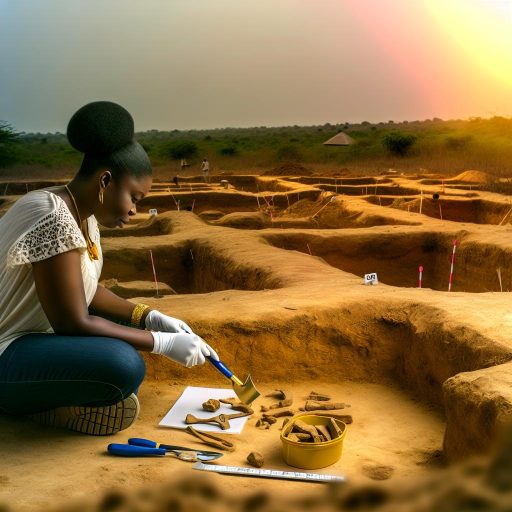Introduction
Exploring the environmental impact of mining in Nigeria is crucial due to its significant role in the country’s economy.
Understanding and addressing the consequences of mining activities is essential for sustainable development.
Overview of Mining Activities in Nigeria
Nigeria has a long history of mining.
This dates back to the 19th century when tin was discovered in Jos.
The colonial government took an interest in mining operations.
This interest led to the establishment of the Nigerian Mining Corporation (NMC) in 1972.
The NMC was tasked with developing and exploiting minerals such as coal, gold, tin, kaolin, and columbite.
However, the mining sector faced challenges.
These included mismanagement, corruption, and lack of infrastructure.
Major Minerals Extracted in Nigeria
Nigeria is blessed with a variety of mineral resources.
This makes it a potential hotspot for mining activities.
Some of the major minerals extracted in Nigeria include coal, tin, iron ore, limestone, gold, and lead-zinc.
These minerals are found in different regions of the country.
Significant deposits are located in states like Zamfara, Plateau, Ebonyi, and Enugu.
Scale and Extent of Mining Activities
Despite having abundant mineral resources, mining activities in Nigeria have not reached their full potential.
The country’s mining sector remains largely underdeveloped.
This is evident with low productivity levels and inadequate infrastructure.
Illegal mining activities are also prevalent in many parts of the country.
These lead to environmental degradation, loss of biodiversity, and health hazards for nearby communities.
Environmental issues caused by mining in Nigeria
Mining activities in Nigeria have caused significant environmental challenges over the years.
Below are some of the key issues associated with mining in the country:
- Deforestation: One of the major impacts of mining in Nigeria is deforestation. Large areas of forest land are cleared to make way for mining operations, leading to the loss of valuable vegetation and wildlife habitats.
- Loss of biodiversity: Mining activities in Nigeria often result in the loss of biodiversity. The disruption caused by mining operations can threaten the survival of plant and animal species, leading to a decline in biodiversity.
- Land degradation: Mining activities can also lead to land degradation in Nigeria. The extraction of minerals can alter the natural landscape and soil composition, making it difficult for vegetation to grow and causing long-term damage to the land.
- Pollution of air, water, and soil: Mining activities in Nigeria contribute to the pollution of the air, water, and soil. The use of heavy machinery and explosives releases harmful pollutants into the environment, contaminating the air, water bodies, and soil.
Outline the various environmental challenges associated with mining in Nigeria
Mining in Nigeria is associated with various environmental challenges that have long-term consequences on the ecosystem.
Some of the key problems include:
- Noise pollution: The constant noise from mining activities can disrupt wildlife habitats and affect the well-being of nearby communities.
- Water pollution: The discharge of toxic chemicals and waste materials from mining operations contaminates water sources, posing a threat to aquatic life and human health.
- Soil degradation: The extraction of minerals can result in the erosion of topsoil and the depletion of nutrients, making the land unsuitable for agriculture and other uses.
- Waste management: Mining activities generate a large amount of waste that is often left untreated, leading to environmental pollution and health risks for local communities.
Discuss pollution of air, water, and soil due to mining activities
Mining activities in Nigeria have a significant impact on the quality of air, water, and soil in the surrounding areas.
Some of the key pollution issues caused by mining operations include:
- Air pollution: Mining activities release dust particles, gases, and fumes into the air, leading to poor air quality and respiratory problems for nearby communities.
- Water pollution: The discharge of mining effluents into water bodies contaminates rivers, streams, and groundwater, making it unsafe for consumption and aquatic life.
- Soil contamination: The spillage of chemicals and waste materials onto the soil can lead to soil contamination, affecting the fertility of the land and posing risks to human health.
- Noise pollution: The operation of heavy machinery and explosives generates noise pollution, disrupting the natural habitat of wildlife and causing stress to local residents.
Mention deforestation, loss of biodiversity, and land degradation as common impacts of mining
Deforestation, loss of biodiversity, and land degradation are common impacts of mining activities in Nigeria.
These environmental consequences have far-reaching effects on the ecosystem and local communities:
- Deforestation: Mining operations require the clearing of large tracts of forest land, leading to deforestation and the loss of important wildlife habitats.
- Loss of biodiversity: The disruption caused by mining activities can lead to the extinction of plant and animal species, reducing biodiversity and ecological balance.
- Land degradation: Soil erosion, nutrient depletion, and alteration of land topography are common outcomes of mining, resulting in land degradation and loss of arable land.
- Impact on communities: The environmental impacts of mining affect local communities, including loss of livelihoods, health hazards, and displacement of indigenous populations.
Uncover the Details: History and Evolution of Anthropology in Nigeria
Case studies of environmental degradation from mining in Nigeria
One of the most well-known cases of environmental degradation from mining in Nigeria is the lead poisoning epidemic in Zamfara State.
This tragic event occurred in 2010 when illegal gold mining activities released toxic levels of lead into the local environment.
It resulted in the deaths of hundreds of people, mostly children.
Examples of mining projects that have led to environmental degradation
- Oil spills in the Niger Delta: The Niger Delta region has been heavily impacted by oil spills from decades of oil extraction activities.
- Destruction of forests in Plateau State: Large-scale mining operations in Plateau State have resulted in the destruction of forests and biodiversity loss.
- Mercury pollution in artisanal gold mining: Artisanal gold mining, particularly in states like Zamfara and Kebbi, has led to the release of mercury into the environment.
Consequences of these projects on local communities and ecosystems
The environmental degradation caused by mining projects in Nigeria has had devastating consequences on local communities and ecosystems. These consequences include:
- Health impacts: Local communities near mining sites suffer from health issues such as lead poisoning, mercury poisoning, respiratory problems, and skin diseases.
- Economic impacts: The destruction of ecosystems and contamination of water sources have affected livelihoods, agriculture, and fishing activities in affected communities.
- Social impacts: Mining activities have led to conflicts, displacement of communities, and loss of cultural heritage in affected areas.
- Ecosystem impacts: Deforestation, habitat destruction, water pollution, and loss of biodiversity have harmed ecosystems and wildlife in mining-affected regions.
Efforts to address these environmental impacts
Despite the severe environmental impacts of mining in Nigeria, there are ongoing efforts and initiatives to address these issues and promote sustainable mining practices.
- Regulation and enforcement of environmental laws: The Nigerian government has implemented regulations and laws to ensure that mining companies adhere to environmental standards and mitigate their impacts.
- Community engagement and capacity building: Stakeholder engagement, community consultation, and capacity building programs are being implemented to involve local communities in decision-making processes.
- Reclamation and restoration: Some mining companies are now required to undertake reclamation and restoration efforts to rehabilitate degraded land.
- Green mining technologies: The adoption of environmentally friendly mining technologies, such as using renewable energy sources, is being promoted to minimize environmental impacts.
The environmental impact of mining in Nigeria is a significant issue that requires urgent attention and concerted efforts from all stakeholders.
By learning from past case studies, addressing the consequences on local communities, and implementing sustainable mining practices, we can promote a healthier and more sustainable future for Nigeria.
See Related Content: How Archaeology Influences Nigerian Tourism
Regulatory Framework and Enforcement of Environmental Laws in Nigeria
Existing Regulatory Framework Governing Mining Activities in Nigeria
The mining sector in Nigeria is governed by the Nigerian Minerals and Mining Act 2007.
The Act provides for the administration of mineral rights, health and safety in mines, and environmental protection.
The Ministry of Mines and Steel Development is the primary regulatory body overseeing mining activities in Nigeria.
The Act also establishes the Mining Cadastre Office responsible for the issuance of mining titles and permits.
Transform Your Career with Expert Guidance
Get personalized mentorship consulting that’s tailored to your unique path. Our expert advice is actionable and exclusive.
Get StartedEffectiveness of Current Environmental Laws and Regulations in Mitigating the Impacts of Mining
Despite the existence of environmental laws, the impact of mining on the environment in Nigeria remains significant.
Mining activities have led to deforestation, soil erosion, water pollution, and loss of biodiversity in affected areas.
The lack of strict enforcement of environmental regulations has contributed to these adverse effects on the environment.
There is a need for stronger monitoring and enforcement mechanisms to ensure compliance with environmental laws.
Challenges Faced in Enforcing Environmental Laws and Regulations
One of the key challenges in enforcing environmental laws in Nigeria is a lack of political will and commitment.
Corruption and inadequate funding for regulatory agencies hamper effective enforcement of environmental laws.
There is also a lack of capacity within regulatory bodies to effectively monitor and regulate mining activities.
Local communities often lack awareness of their rights and the environmental impacts of mining, making enforcement more challenging.
See Related Content: Notable Nigerian Anthropologists and Their Works

Stakeholder Involvement and Community Engagement in Sustainable Mining Practices
Involving stakeholders and local communities in decision-making processes related to mining is crucial for promoting sustainable practices in Nigeria.
By considering the perspectives and concerns of all relevant parties, mining companies can mitigate negative impacts on the environment and society while maximizing the benefits of mineral extraction.
Importance of Involving Stakeholders and Local Communities
Stakeholders, including government agencies, non-governmental organizations, local communities, and indigenous groups, play a vital role in shaping the policies and practices of the mining sector.
Their input can help identify potential risks, develop mitigation strategies, and ensure that mining activities align with sustainability goals.
Local communities, in particular, are directly affected by mining operations, as they may experience disruptions to their livelihoods, health hazards, and environmental degradation.
By engaging with these communities, mining companies can build trust, address concerns, and co-create solutions that benefit all parties involved.
Role of Community Engagement in Promoting Sustainable Mining Practices
Community engagement serves as a platform for dialogue, collaboration, and empowerment, enabling local residents to participate in decision-making processes that impact their lives and environment.
By involving communities in planning, monitoring, and evaluation activities, mining companies can enhance transparency, accountability, and social responsibility.
Furthermore, community engagement helps build social capital, foster inclusive development, and promote the well-being of marginalized groups.
By empowering local communities to assert their rights, advocate for their interests, and participate in development projects, mining activities can contribute to sustainable socio-economic growth in the long run.
Examples of Successful Collaborations
- Community Development Agreements (CDAs): In Nigeria, some mining companies have established CDAs with local communities to outline mutual responsibilities, benefits, and grievance mechanisms. These agreements have helped enhance community participation, promote socio-economic development, and minimize conflicts.
- Corporate Social Responsibility (CSR) Initiatives: Many mining companies in Nigeria have implemented CSR programs to support education, healthcare, infrastructure, and environmental conservation in nearby communities. By engaging in philanthropic activities, these companies have fostered positive relationships with local residents and contributed to sustainable development.
- Government-Community Partnerships: The Nigerian government has initiated partnerships with local communities to address environmental challenges, promote sustainable practices, and ensure equitable distribution of mining benefits. Through collaborative initiatives, such as capacity-building workshops, resource sharing, and participatory decision-making, stakeholders have worked together to improve the overall social and environmental impact of mining in Nigeria.
Stakeholder involvement and community engagement are essential components of sustainable mining practices in Nigeria.
By creating opportunities for dialogue, collaboration, and shared decision-making, mining companies, government agencies, and local communities can work together to achieve environmental protection, social equity, and economic prosperity.
Delve into the Subject: The Future of Chemical Sciences in Nigeria
Environmental Impact of Mining in Nigeria
The environmental impact of mining in Nigeria is alarming and cannot be ignored.
Deforestation, soil erosion, and water pollution are evident consequences of mining activities.
Nigeria must prioritize sustainable mining practices to mitigate these negative effects.
There is a need for greater awareness, accountability, and action to address mining’s environmental impact.
Implementing stricter regulations, enforcing compliance, and promoting responsible mining practices can help.
Nigeria can protect its environment for future generations through these actions.
Additional Resources
Environmental health situation in Nigeria: current status and future …
Nigeria’s water crisis: Abundant water, polluted reality – ScienceDirect




